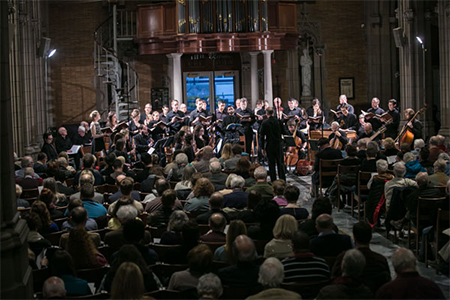by Nicholas Stevens

Few choral pieces introduce Passiontide themes as comprehensively as Gregorio Allegri’s Miserere, a sequential ritual in sound. The music shifts from full choir to chanting low voices to solo quartet on each of the twenty verses of Psalm 51. Wilson placed the small group behind the audience, across the space from the main choir. The effect was hair-raising. Soprano Kristine Caswelch soared with each repetition, soprano Sarah Coffman and countertenor John McElliott blended well in the middle, and bass Robert Stark held fast as the foundation of the semi-chorus.
Bruckner’s motet Christus Factus Est and Brahms’ chorale prelude on “Herzlich tut mich verlangen” brought yearning and angst to messages of commemoration and atonement. The choir navigated Bruckner’s harmonic twists and turns with a laudable commitment to pitch, and organist Nicole Keller brought rhythmic flexibility to the Brahms piece — at moments more reminiscent of Philip Glass than of anything from the 19th century.
Pärt’s Passio, a setting of texts from the Passion according to St. John, loomed over the rest of the program like a massive altarpiece behind a curtain. Wilson and the Choir rent that veil with a series of almost strident exclamations for full vocal ensemble. Radiant clusters of pitch grow from basic harmonies as the choristers introduce the story, Pärt evoking the multicolored brilliance of stained glass. An hour later, glorious resolution arrives in the form of a similar passage, as the choristers sing “have mercy, Amen” at full strength and in thrilling, sun-soaked harmony.
Any Passion setting worthy of the title will ask its audience to reflect on the unfolding tragedy and its implications. Bach accomplished this with sorrowful chorales and charged arias in his oratorio-Passions, while Pärt does it through mournful, numbing repetition. The middle section invites listeners into a state of contemplation, full of repeated figures and soft clashes of pitch.
As Jesus, Daniel Fridley achieved just the right balance of telling calm and knowing intensity. In his spotless, resonant bass, he sang of a “Kingdom not of this earth” in a way that seemed to tear open a portal to that other realm. As Pilate, Corey Shotwell radiated apprehension with his lovely and well-supported tenor, humanizing the conflicted lawman.
Evangelists Kristine Caswelch, Elena Mullins, José Gotera, and Brian McGilvray took solo moments, but also teamed up in duos and trios as the drama unfolded, channeling the ever-mounting tension of the story. The instrumentalists — violinist McKenna Glorioso, cellist William Cayanan, oboist Josiah Dyck, and bassoonist Mark DeMio, plus Keller in the loft — respected Pärt’s focus on the voice, wreathing singers’ utterances in sensitive counterpoint.
All of the performers embraced Pärt’s vision for the work: a recounting of events so ritualistic and sparsely decorated as to make Bach’s Passions seem like action movies by comparison. But within this framework they built tension along linear paths — even at its most static, the piece felt like it was going somewhere. Trinity’s Good Friday concert served as a powerful reminder that music need not always aspire to spectacle. Some performances produce their effect through a strange and uncomfortable magic that suspends time, rations resolution, and leaves audiences changed. This was one.
Published on ClevelandClassical.com April 4, 2018.
Click here for a printable copy of this article



